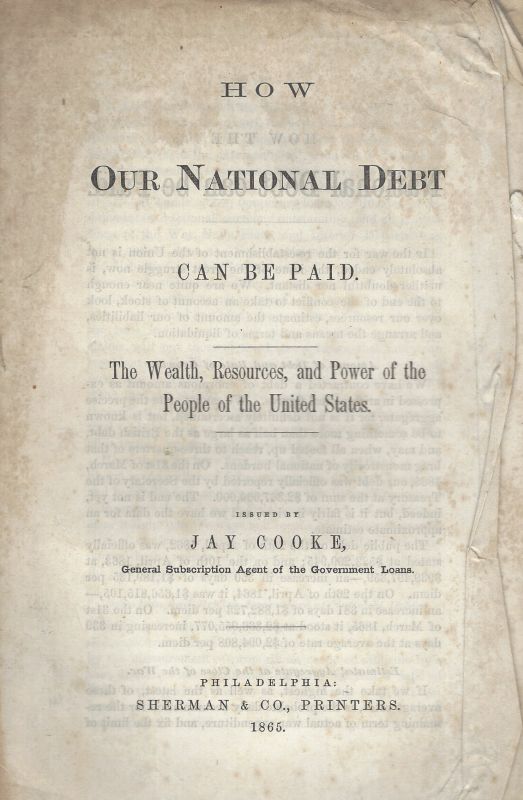Cooke, How our National Debt can be paid.
How our National Debt can be paid. The Wealth, Resources and Power of the People of the United States. Prepared by Dr.William Elder, of the Treasury Department.
Philadelphia, Sherman & Co., 1865. 8°. 15 pages. Softcover. Original Pamphlet. Original brochure. Dogeared. Foxed. Extremely rare original pamphlet reflecting the costs, revenue possibilities etc. of the times previous, in and after the American Civil War.
Jay Cooke (August 10, 1821-February 8, 1905), American financier, was born at Sandusky, Ohio, the son of Eleutheros Cooke (1787-1864), a pioneer Ohio lawyer and Whig member of Congress from that state in 1831-1833 and member of the Ohio General Assembly.
Jay Cooke received a preliminary training in a trading house in St. Louis, Missouri, and in the booking office of a transportation company in Philadelphia. At the age of eighteen, he entered the Philadelphia house of E.W. Clark & Company, one of the largest private banks in the country. Three years later, he was admitted to membership in the firm and, before the age of 30, was also a partner in the New York City and St. Louis branches of the Clarks.
In 1858, he retired from the firm, and, for the next three years, he devoted himself to reorganizing abandoned Pennsylvania railways and canals and placing them again in operation. On January 1, 1861, he opened the private banking house of Jay Cooke & Company in Philadelphia and quickly floated a war loan of $3,000,000 for the state of Pennsylvania.
In the early months of the American Civil War, Cooke collaborated with the secretary of the treasury Salmon P. Chase in securing loans from the leading bankers in the Northern cities; his own firm was so successful in distributing treasury notes that Chase engaged him as special agent for the sale of the $500,000,000 of so-called “five-twenty” bonds—which were callable in 5 years and matured in 20 years—authorized by Congress on February 25, 1862. The treasury department had previously failed in selling these bonds.
Cooke secured the influence of the American press, appointed 2,500 sub-agents, and quickly sold $11,000,000 more in bonds than had been authorized. Congress immediately sanctioned the excess. At the same time, Cooke influenced the establishment of national banks, and organized a national bank at Washington and another at Philadelphia almost as quickly as Congress could authorize the institutions.
In the early months of 1865, with the government facing pressing financial needs in the wake of disappointing sales of the new “seven-thirty” notes by the national banks, Cooke’s services were again secured. He sent agents into remote villages and hamlets, and even into isolated mining camps in the west, and persuaded rural newspapers to praise the loan. Between February and July 1865 he disposed of three series of the notes, reaching a total of $830,000,000. This allowed the Union soldiers to be supplied and paid during the final months of the war.
It was in this effort that he pioneered the use of price stabilization. This practice, whereby bankers stabilize the price of a new issue, is still in use by investment bankers in IPOs and other security issuances. (Source: Wall Street by Charles Geisst) REALLY ??
In the Republican nominating process of 1868, which eventually saw Ulysses S. Grant as the Republican party standard-bearer, Cooke backed Radical Republican Chief Justice Salmon P. Chase for President. (Wikipedia)
- Keywords: 19.Jahrhundert · 19th Century · 19th Century – Rare · American Civil War · American Civil War Pamphlets · American History · American History – Rare · Pamphlets
- Language: English
- Inventory Number: 23034AB
EUR 150,--
© 2025 Inanna Rare Books Ltd. | Powered by HESCOM-Software










